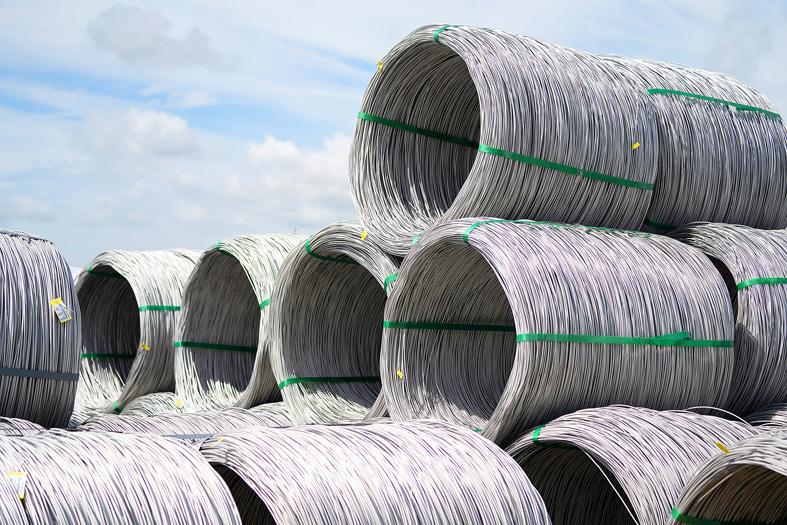Walsin Lihwa Corp (華新麗華) yesterday raised its stainless steel product prices for delivery next month by as much as NT$17,000 per tonne, as the Russia-Ukraine war fueled concern over tight supply of nickel.
The company said it would raise the price of 304 series stainless steel products, which contain 8 percent nickel and are the most versatile and widely used stainless steel — by NT$17,000 per tonne for local customers and by US$600 per tonne for overseas customers next month.
That represented a steep increase from its price adjustments of NT$$6,000 per tonne for domestic and US$200 per tonne for overseas deliveries this month.

Photo courtesy of Walsin Lihwa Corp
Prices for other types of stainless steel products would be double those of prices for this month.
The price of stainless steel containing copper is to jump by NT$3,000 per tonne for domestic customers and by US$100 per tonne for overseas clients, company data showed.
The prices of 400 series stainless steel products are to go up by NT$3,000 per tonne for local sales and by US$100 per tonne for export sales.
Walsin Lihwa said it was hiking prices in line with price increases by North American and European suppliers of stainless steel products, as the costs of raw materials, coking coal, crude oil and natural gas rise amid geopolitical tensions, surging inflation and major central banks’ move to tighten monetary policy.
The price of 304 stainless steel soared by US$530 per tonne in North America, as global nickel prices hovered at a nearly 11-year high of US$27,778 per tonne, while European suppliers raised prices by US$830 per tonne, factoring in the introduction of energy surcharges.
Russia accounts for about 7 percent, 6 percent and 3.5 percent of global supplies of nickel, aluminum and copper respectively.

Intel Corp chief executive officer Lip-Bu Tan (陳立武) is expected to meet with Taiwanese suppliers next month in conjunction with the opening of the Computex Taipei trade show, supply chain sources said on Monday. The visit, the first for Tan to Taiwan since assuming his new post last month, would be aimed at enhancing Intel’s ties with suppliers in Taiwan as he attempts to help turn around the struggling US chipmaker, the sources said. Tan is to hold a banquet to celebrate Intel’s 40-year presence in Taiwan before Computex opens on May 20 and invite dozens of Taiwanese suppliers to exchange views

Application-specific integrated circuit designer Faraday Technology Corp (智原) yesterday said that although revenue this quarter would decline 30 percent from last quarter, it retained its full-year forecast of revenue growth of 100 percent. The company attributed the quarterly drop to a slowdown in customers’ production of chips using Faraday’s advanced packaging technology. The company is still confident about its revenue growth this year, given its strong “design-win” — or the projects it won to help customers design their chips, Faraday president Steve Wang (王國雍) told an online earnings conference. “The design-win this year is better than we expected. We believe we will win

Chizuko Kimura has become the first female sushi chef in the world to win a Michelin star, fulfilling a promise she made to her dying husband to continue his legacy. The 54-year-old Japanese chef regained the Michelin star her late husband, Shunei Kimura, won three years ago for their Sushi Shunei restaurant in Paris. For Shunei Kimura, the star was a dream come true. However, the joy was short-lived. He died from cancer just three months later in June 2022. He was 65. The following year, the restaurant in the heart of Montmartre lost its star rating. Chizuko Kimura insisted that the new star is still down

While China’s leaders use their economic and political might to fight US President Donald Trump’s trade war “to the end,” its army of social media soldiers are embarking on a more humorous campaign online. Trump’s tariff blitz has seen Washington and Beijing impose eye-watering duties on imports from the other, fanning a standoff between the economic superpowers that has sparked global recession fears and sent markets into a tailspin. Trump says his policy is a response to years of being “ripped off” by other countries and aims to bring manufacturing to the US, forcing companies to employ US workers. However, China’s online warriors